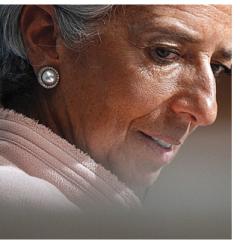Institutional Investor International Editor Tom Buerkle will be reporting live from the Tokyo meetings throughout the week. Be sure to check out his daily posts on the meetings and the buzz from international bankers and investors gathered there.
Reviewing the global economic outlook late last month, International Monetary Fund chief Christine Lagarde abundantly praised the U.S. Federal Reserve Board.
The Fed’s latest commitment to buy mortgage bonds, indefinitely this time, along with similar steps by the European Central Bank and the Bank of Japan, are “big policy signals in the right direction” that offer the best chances of jolting advanced economies to life, Lagarde said.
“Just as the central banks were misguided during the Great Depression and accelerated that crisis, it may well be that central banks will have played a significant role in pulling the global economy out of this Great Recession,” Lagarde said in a September 24 speech at the Peterson Institute for International Economics in Washington.
On the same afternoon, at the IMF’s offices a few blocks away, several academics and policymakers participating in a forum on financial services in developing economies provided a more jaundiced view of quantitative easing.
Franklin Allen, a professor of finance and economics at the Wharton School, pointed out that Japan’s economy is still struggling more than two decades after the country’s equity and real estate bubbles burst, despite several rounds of QE by the BoJ. “We seem to be going the same way,” Allen said. The Fed “can print money, but growth doesn’t look good.”

Yet there are few levers left for policymakers to pull. Open-ended bond purchases represent a bold move by the Fed, but the central bank is acting on its own because of the political gridlock that grips Washington. Morgan Stanley surveyed its clients about the U.S. fiscal outlook late last month. Roughly three quarters of them said that fiscal uncertainty is hurting the economy now and will continue to do so in 2013; two thirds predicted the government will avoid any serious budget compromise and keep kicking the can down the road regardless of who wins the November election.
That’s a sobering prospect considering how difficult it would be, even with the best of intentions, to deal with today’s high debt levels. Last month the IMF released a study titled “The Good, the Bad, and the Ugly: 100 Years of Dealing with Public Debt Overhangs.” It reviewed 26 cases — some extending back to the 19th century — in which advanced economies allowed public debt to exceed 100 percent of GDP. Those countries tended to have lower-than-average growth, and they struggled to get back to fiscal health. After 15 years the median debt-to-GDP ratio had improved by only 10 percentage points. Currently, Greece, Ireland, Italy, Japan, Portugal and the U.S. are above the 100 percent threshold, according to IMF figures, and several European countries are not far below it.
The Fund’s policy advice for the U.S.: Avoid the fiscal cliff, the package of big tax hikes and spending cuts due to take effect at the start of 2013, while taking steps to reduce the deficit over the medium term. Lagarde isn’t pressing her case too hard yet, though, knowing that no one in Washington is listening. The crowd in Tokyo will be hoping that changes come before year-end.
As for the Fund’s other big preoccupation, Lagarde continues to exhort European Union leaders to press ahead with structural reforms of the euro area, but political differences have slowed progress on a banking union and a bailout for Spain, a topic likely to loom large in Tokyo.
ECB president Mario Draghi has promised to support Spanish bond prices provided that the country first reaches a bailout agreement with EU authorities. Draghi and German Chancellor Angela Merkel want the IMF to join in any bailout because of its expertise in imposing economic conditionality.
Spain’s prime minister, Mariano Rajoy, is resisting the pressure. “The Spanish don’t want us in there,” says one Fund official. It’s bad enough to have to go to your EU partners for money. Going cap in hand to the IMF could be political suicide.
The annual meetings may underscore the West’s political paralysis and stagnant growth. The choice of Japan as a setting seems sadly appropriate.






